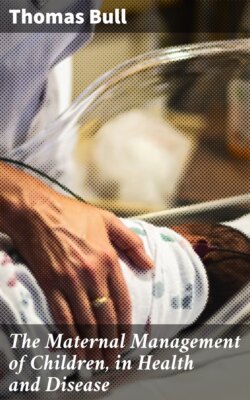Читать книгу The Maternal Management of Children, in Health and Disease - Thomas Bull - Страница 16
На сайте Литреса книга снята с продажи.
THE INJURIOUS EFFECTS TO THE MOTHER AND INFANT OF UNDUE AND PROTRACTED SUCKLING.
ОглавлениеTable of Contents
UPON THE MOTHER.—The period of suckling is generally one of the most healthy of a woman's life. But there are exceptions to this as a general rule; and nursing, instead of being accompanied by health, may be the cause of its being materially, and even fatally, impaired. This may arise out of one of two causes, either, a parent continuing to suckle too long; or, from the original powers or strength not being equal to the continued drain on the system.
Examples of the first class I am meeting with daily. I refer to poor married women, who, having nursed their infants eighteen months, two years, or even longer than this, from the belief that by so doing they will prevent pregnancy, call to consult me with an exhausted frame and disordered general health, arising solely from protracted nursing, pursued from the above mistaken notion.
I most frequently meet with examples of the second class in the delicate woman, who, having had two or three children in quick succession, her health has given way, so that she has all the symptoms arising from undue suckling, when perhaps the infant at her breast is not more than two or three months old.
Since the health of the mother, then, will suffer materially from this circumstance, she ought not to be ignorant of the fact; so that, when the first symptoms manifest themselves, she may be able to recognise their insidious approach; and tracing them to their real cause, obtain medical advice before her health be seriously impaired.
SYMPTOMS.—The earliest symptom is a dragging sensation in the back when the child is in the act of sucking, and an exhausted feeling of sinking and emptiness at the pit of the stomach afterwards. This is soon followed by loss of appetite, costive bowels, and pain on the left side; then, the head will be more or less affected, sometimes with much throbbing, singing in the ears, and always some degree of giddiness, with great depression of spirits.
Soon the chest becomes affected, and the breathing is short, accompanied by a dry cough and palpitation of the heart upon the slightest exertion. As the disease advances, the countenance becomes very pale, and the flesh wastes, and profuse night perspirations, great debility, swelling of the ankles, and nervousness ensue. It is unnecessary, however, to enter into a more full detail of symptoms.
TREATMENT.—All that it will be useful to say in reference to treatment, is this; that, although much may be done in the first instance by medicine, change of air, cold and sea bathing, yet the quickest and most effectual remedy is to wean the child, and thus remove the cause.
THE ILL EFFECTS UPON THE INFANT.—There is another and equally powerful reason why the child should be weaned, or rather, have a young and healthy wet-nurse, if practicable. The effects upon the infant, suckled under such circumstances, will be most serious. Born in perfect health, it will now begin to fall off in its appearance, for the mother's milk will be no longer competent to afford it due nourishment; it will be inadequate in quantity and quality. Its countenance, therefore, will become pale; its look sickly and aged; the flesh soft and flabby; the limbs emaciated; the belly, in some cases, large, in others, shrunk; and the evacuations fetid and unnatural; and in a very few weeks, the blooming healthy child will be changed into the pale, sickly, peevish, wasted creature, whose life appears hardly desirable.
The only measure that can save the life, and recover an infant from this state, is that which would previously have prevented it a healthy wet-nurse.
If the effects upon the infant should not be so aggravated as those just described, and it subsequently live and thrive, there will be a tendency in such a constitution to scrofula and consumption, to manifest itself at some future period of life, undoubtedly acquired from the parent, and dependent upon the impaired state of her health at the time of its suckling. A wet-nurse early resorted to, will prevent this.
It will be naturally asked, for how long a period a mother ought to perform the office of a nurse? No specific time can be mentioned, and the only way in which the question can be met is this: no woman, with advantage to her own health, can suckle her infant beyond twelve or eighteen months; and at various periods between the third and twelfth month, many women will be obliged partially or entirely to resign the office.[FN#4]
[FN#4] See "Weaning," p. 51.
The monthly periods generally reappear from the twelfth to the fourteenth month from delivery; and when established, as the milk is found invariably to diminish in quantity, and also to deteriorate in quality, and the child is but imperfectly nourished, it is positively necessary in such instances at once to wean it.
